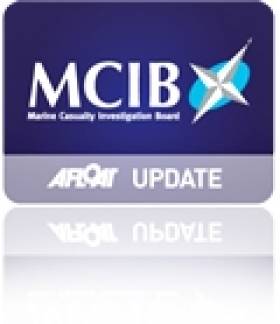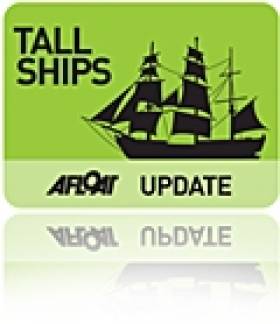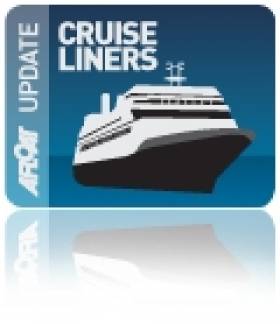Displaying items by tag: Gathering Cruise
Altering Passage For 'Promotional Activities' Led to Loss of Tall Ship Astrid – MCIB Report
#astrid – If the initial MAYDAY message from the Sail Training Ship Astrid had been sent out in the correct format the emergency services could have been activated 10 minutes earlier, which could have been critical to the final outcome had conditions been more severe, according to a Marine Casualty Investigation Report (MCIB) published today.
The 95-year-old vessel ran aground on to Rocks off Kinsale during a photocall for the Irish Sailing Association Gathering Cruise promotion, prompting dramatic scenes as 30 people were rescued from rough seas. The vessel ran aground on July 24th 2013.
The main cause of the grounding is that the ship was not operated in a safe manner in compliance with the International Conventions, the report says.
In its conclusions the MCIB states: 'The correct passage planning procedures should have been carried out and the Master should not have altered his passage in an unsafe manner to facilitate promotional activities'.
The report also concluded that passage planning of the voyage from Oysterhaven to Kinsale was inadequate for a ship to navigate a course within 300 (m) of a lee shore in a Force 6 wind. The report says passage planning appears to have been influenced by the 'desire for photograph opportunities' for the Irish Sailing Association's (ISA) 'Gathering' cruise. The report says SOLAS Chapter V Regulation 34 was not complied with.
Mike MacSweeney, a photographer on the media boat that day told Afloat.ie: 'I wish to unequivocally state the following as a matter of record there were no instructions or requests from the media boat to the skipper or anyone onboard the Tall Ship Astrid before or after leaving Oysterhaven on the day in question'.
MacSweeney adds: 'Any actions taken by the Astrid were solely the decision of the Tall Ship Astrid. The first interaction between the media boat and the Tall Ship Astrid was when the ship was in difficulty and the media boat assisted in the rescue'.
The report concludes the immediate cause of the ship grounding and subsequent sinking can be attributed to the loss of power from the main engine. The main engine stopped as a result of fresh water contamination of the fuel. The cause of the water contamination can be attributed to human error when taking on fresh water in Brighton on 12th July 2013. Once water contamination had been found, insufficient action was taken to ensure fresh water was removed from the fuel system.
It went on: 'The operation and condition of the ship did not correspond with the applicable SOLAS Conventions, presenting a danger to the ship and the persons on-board and a threat of harm to the marine environment'.
The ship was not certified as a passenger ship for either EU or international voyages nor were the crew appropriately certified and the ship should not have been at sea, according to the MCIB.
The emergency services responded in a timely manner and effected the recovery of 30 persons without injury.
The MCIB made four recommendations including that the operators of sail training vessels should ensure that they comply with international conventions and European Union law.
It also said sail training ships entering Irish waters and ports must comply with the regulations, and that ships engaged in promotional activities must ensure that the Master has over-riding authority and that the Master must not compromise good passage planning and safety when involved in such activities.
A link to download the report as a (17mb) PDF file is HERE.
Tall Ship Astrid, A Sorry Sight for Irish Waters
#astrid – A month after she hit rocks near Oysterhaven, Kinsale, County Cork, during the Irish Sailing Association (ISA) Gathering Cruise, the 42–metre Dutch Tall Ship Astrid makes a sad picture, still trapped on rocks, her beautiful sails torn and ripped by the sea but amazingly her rig still intact.
A night before the accident, on July 23rd, the only square rigger on the cruise, made for an altogether different picture moored in Oysterhaven Bay.
24 hours later, the 100–year–old vessel hit rocks inside the Sovereign Islands at Ballymacus Point, near Kinsale during a promotional photocall.
The training ship had lost power and was apparently driven on to rocks by a strong southerly wind at the western entrance to Kinsale Harbour. The grounded vessel quickly took on water.
A lot has happened since then, none of it for the good of Astrid though. Thoughts of any salvage attempt of this great hull have fast receded. For now the scene is just a daily reminder why water safety cannot be taken for granted and how impressive the Irish Rescue services were on July 24th, rescuing all 30 crew and trainees. A number of accident investigations are underway.
For all Afloat's previous stories on the Tall Ship Astrid Rescue click this link.
Gathering Cruise Flotilla and Five-Masted Cruiseship to Centre on Dun Laoghaire Harbour
#GatheringCRUISES- On the same day of the eagerly awaited Gathering Cruise which sets off next Thursday (18 July) from Dun Laoghaire Harbour, the Wind Surf a 14,745 tonnes cruiseship sporting five masts and each 50m/164 ft-high is due to berth, writes Jehan Ashmore.
Wind Surf has 7 triangular, self-furling, computer-operated sails with 26,881 square feet (or 2,600 square meters) on a Dacron surface area.
The 7-decked vessel has a guest capacity for 310 who are accommodated in 123 de-luxe ocean-view staterooms and a couple of de-luxe suites situated on the bridge deck.
Originally the Wind Surf was launched as Club Med 1 and her sister as previously reported is the Club Med 2 which recently called to Irish ports for the first time to include Dublin Port.
Operators Windstar Cruises are bringing the 1998 built vessel to Irish waters in what is undertood to be also her inaugural visit to Irish waters and this evening the ship departed Portsmouth bound for Dartmouth.
Following her call to the Devon port, the cruise which is a total of 7-nights (with fares starting from around £2,300 sterling per person), is also to visit Falmouth, the Scilly Isles, Milford Haven and Holyhead.
The Co. Waterford coast will in fact be her first Irish port of call where the 162m/535ft vessel is due to anchor off Dunmore East on 16 July. While on the same day the Sea Cloud II, another luxury cruise tallship rigged with three-masts is to call to Dublin Port following her visit to Cork Harbour which is scheduled to call this Saturday.


























































